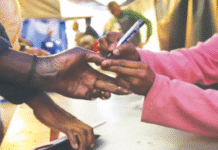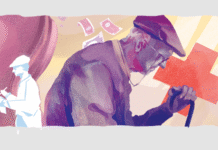The Baishakh this year resembles the turmoil of a summer storm more than the placid celebration of spring. We are moving through a time of anxiety and confusion. Everyone is telling us what is right, what is wrong. They are questioning our identity and we are trying to impose our own on others. We have been put in situations whereby the political state whatever little bit of it is left has experienced extreme stress. Extra-constitutionality has become commonplace and many think nothing of advocating torture on their political enemies. Something has gone deeply wrong with us and our state. More than celebration, we need reflection.
* * *
At least some, if not many will not be celebrating but resisting the rise of a new political force called Hifazat-e Islam. Its arguments are particularly unacceptable when it comes to women, and the kind of Hifazat vision doesn’t exist in any parts of the world except in Pakistan and maybe parts of India. Yet it does in Bangladesh quite strongly and the material basis for that is the existence of the Quami Madrassah system where the textbooks haven’t been changed in several centuries possibly. It’s entirely out of sync with the national aspirations of Bangladesh. It’s not a question of what goes and doesn’t go with urban middle-class sensibilities and cultural expressions but what is rejected by a more relevant vision of an inclusive empowering society which Hifazat opposes.
* * *
If Hifazat seemed so alien to many, it’s because we have no idea about the rural poor. The Long March probably gave a glimpse into their world and thinking for the first time after 1972 in a way that made us take notice. Suddenly, they were no longer the distant peasant who we imagine sings while working in the field, whose wife brings lunch to him and evenings are spent listening to dotara music, the badly imagined world of our movies and natoks. These sons of peasants were angry with us and said only their world view was correct and insisted we join it. There was an element of déjà vu in their call. It was like a one-party system, a sort of a religious BKSAL. It’s something we rejected before and something we have done now. But just as we had been happy to dump it without solving the problems that created BKSAL, we may do the same with Hifazat. They are not a threat to anyone but they ignite fears deep within us.
* * *

Photo: Reuters
Hifazat-e Islam is a product of rural poverty and an education system that can only lead to a career in the madrassahs and mosque. The Qaumi madrassah system is the recipient of those who have no future and can’t even imagine a future elsewhere and no other place to go. They never gain qualifications to join the world and we have never bothered to welcome them in. The gathering at Dhaka had many elements including political ones but it was also a call for attention from them and a wakeup call for the rest.
* * *
But the response of the ‘scared middle class’ has been to celebrate Baishakh with the kind of symbols, language and meanings which contests the Hifazat imagination. Hence it’s a celebration of resistance against the Hifazat’s Islamic imagination. In many ways it’s a reaction to an attempt of assertion by a world most of us have never seen.
We always talk of the widening gap between the rich and the poor that is the economic gap but the recent events have shown that the cultural gap between the have-nots and the have-something is even bigger. All these gaps exist; we ignore them but don’t realize that it’s through these gaps that the chariots of instability run in.
* * *
What we need is Baishakh not just of songs and dances and panta bhaat but to understand and celebrate the values that make us Bengalis; Hindu, Muslim or Nastik. These values are more authentic than the saree and kurta and the face painted expressions of our national identity. Here are three events from history which we should ponder upon.

Photo: Reuters
We have always been mixing our faiths and social practices so each stage is an overlap of the previous one. Almost everything is an accumulation of our traditions ranging from Buddhist to Wahabi Islam. This has happened in every society including the Middle Eastern from which the three very similar Abrahamic traditions rose. We are an inclusive people and we have to learn to live with our own cultural diversity. But to insist that all must support one narrative happens when there is socio-economic turmoil as its happening now. The partisan politics of the AL-BNP type has few historical references in our culture. Culturally, this is the biggest break with Bengali tradition.
We are a natural ‘secular’ people because we try to assimilate. But we have always lived with religion and faith because it helps us survive. Most of the exclusionary ideas that ails our society have come from outsiders whether the caste system carrying Senas of Karnataka or the madrassah founding central Asian invaders under Bakhtiyar Khilji. Bengalis are the great social mixers and hyper emotional so we have been more moved by devotional songs than scriptures. We would rather do the more important things in life like raising a family, getting them educated, and hoping nothing bad happens to them so getting some quality tabiz than discussing political and theological issues.
The colonial era also produced a high number of educated middle-class and the zamindary system which alienated them from the poorer social classes so today’s middle-class has no empathy for the poor, no cultural connection with them and are some of the most intolerant people on earth. We negotiate our political life using village politics which is why it has no space for negotiations. We refuse to endorse modernity’s principles which include tolerance, engagement and respect for human rights. We are‘khets’ in trousers and we don’t want to give it up either.
We need to move on and instead of the anondo, maybe a few could focus on what makes us Bengalis.
* * *
This Baishakh, we are in considerable discomfort due to political conflicts and many are feeling threatened by the emergence of new forces but if we reflect on the reasons why — no doubt a difficult task for a people who celebrate emotions over intellect — it might become clear that we are producing our own nemesis. Today it’s the Hifazat, probably fuelled by the Jamaat-e-Islami and its allies or some say the AL itself — but tomorrow’s horseman who rides into town may be more focused and not go away. Whether we want that, is up to us.
Source: bdnews24











While the writer has a balanced approach, I think he/she is missing a very basic point. Out of 90 % Muslim population of Bangladesh, probably 80% are Allah fearing simple Muslims who try to practice their religion in whatever way they think it should be. This mostly constitutes, praying 5 times a day and reading the Quaran and having highest respect for the Prophet (PBUH). The so called ‘intelectuals’, the AL and so called ‘progressive media’ never appreciated this and since liberation have been trying to undermine and look down on this Muslim population in the name of ‘Secularism’. This has slowly infiltrated in the Islamic values, gave rise to unIslamic culture and in its extreme, profiled religion fearing people as somebody with beard and cap who is anti-lberation and rajakars. For too many years all governments have failed to recognise this majority population as important part of democracy. The neo-millionaires who made money through corruption in politics and business apparently decide what people should think and do. The backlash from Shahbagh movement led by atheist Bloggers acted as the trigger point for many years of resentment of progressive people towardsn religion fearing people as they felt pushed to the wall. Hifazat may be orchestared by the government or they may be backed by Jamat or BNP or even Saka Chy as some people are fantacising, it really doesn’t matter as the people who joined the long march are mostly non-political and the neglected population of Bangaldesh. Unless respect is resored on Islam by the intellectulas, media and the AL, it will be difficult to reign the non political Islamist population. But who will lead them in their pusuit of establishing their religious rights will be an interesting observation.